a different kind of home shaped by life-saving queer friendships
- Written by Leigh Boucher, Senior Lecturer – Modern History, Macquarie University
Our writers nominate[1] the TV series keeping them entertained during a time of COVID.
Binge watching a gut-wrenching story about the early years of the HIV/AIDS epidemic might seem like a strange choice in Sydney right now. What possible solace could be found in a story about a group of young friends in 1980s London who found their joyful steps towards the creation of a queer world fractured by fear and death?
I rewatched the five-part British TV series It’s a Sin in lockdown recently, and the sorrow that reverberates through the show resonated a little more potently than it did on my first viewing earlier this year. It also, though, in its elaboration of joyful possibilities fractured by an epidemic, helped me make sense of some of the intangible losses of lockdown.
As counsellor Neeraja Sanmuhanathan has written[2], many in lockdown are feeling “disenfranchised grief”. Yet even naming these feelings risks insensitivity, because others are dealing with grief much more difficult to bear.
New South Wales Premier Gladys Berejiklian speaks from a rhetorical playbook of unity, discipline and shared citizenship obligations to compel Sydneysiders to stay at home under lockdown. It’s a Sin can help us consider how the sorrows and hardships of these obligations are unevenly distributed, for they depend on what your home looks like, and whether it is your primary source of nourishment and care.
Read more: Think of it this way: at least you're not locked down with drunken, misanthropic bookshop owner Bernard Black[3]
Queer networks
It’s A Sin opens in 1981. A group of young Londoners find their way to each other and a queer life as new forms of social visibility are being carved out from the grip of homophobic discrimination and sentiment.
We soon come to love, even if they sometimes behave a little poorly, Olly (a star-making turn from Year and Years frontman[4] Olly Alexander), Roscoe (Omari Douglas), Colin (Callum Scott Howells) and Jill (Lydia West) as their lives converge in a share house, “the Pink Palace”, which becomes the emotional centre of the story.
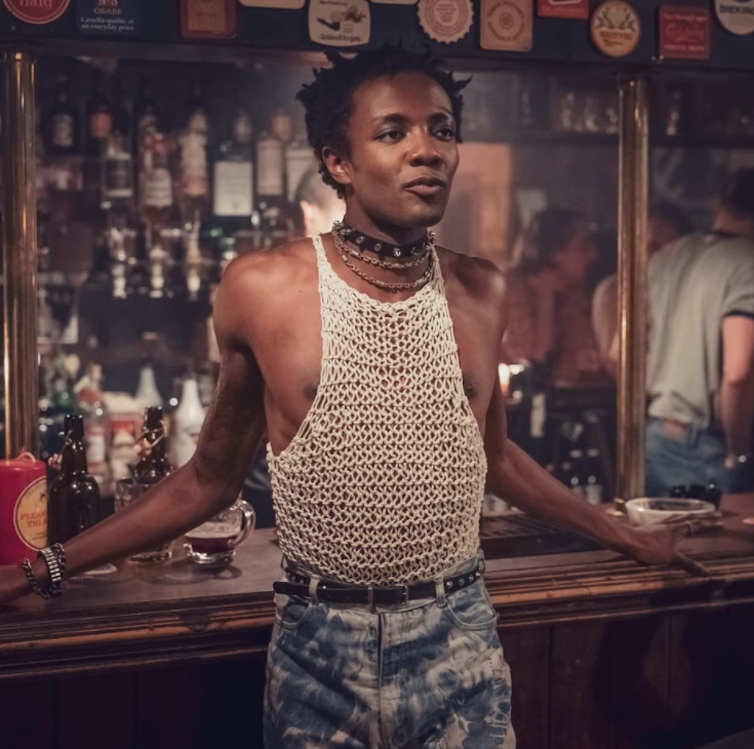 Omari Douglas in It’s a Sin.
Red Production Company
Omari Douglas in It’s a Sin.
Red Production Company
They are a diverse lot, both in ambition and background. All, in different ways, seek to escape the futures mapped for them by others, although what they would like to become is much less clear.
Exuberant confusions and experiments are at the centre of the first few episodes. I challenge anyone not to be totally undone by Colin’s endearing uncertainties as he takes tentative steps into homosexual worlds. We see parties, drinks at the pub, exciting intimacies. And The Pink Palace develops its own tender traditions and vocabularies; the housemates exclaim “La” to each other as they enter and exit the house. These are the everyday familiarities that feel like a hug of recognition.
Rather than a world organised by biological family and the romantic couple, friendship is sovereign here. These new kinds of friendship prioritise pleasure and joy. They are full of disordering excitements that produce new ways to understand their world.
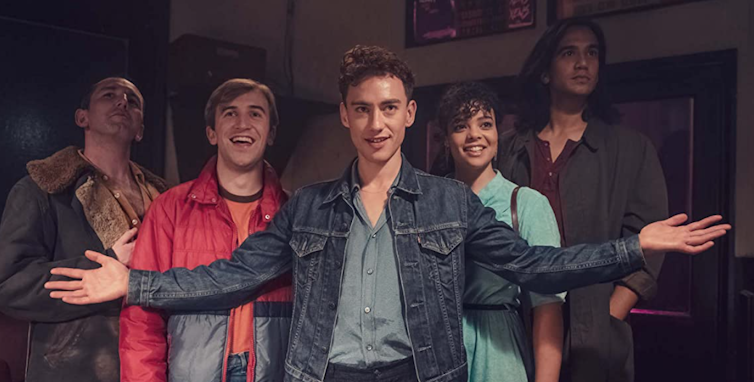 Friendship is sovereign in The Pink Palace.
Red Production Company
Friendship is sovereign in The Pink Palace.
Red Production Company
This is why the emergence of HIV/AIDS, which haunts the show from the first episode, feels so tragic. Just as historical change produced the possibility of forging queer public worlds — spaces for dissident desires — an epidemic ravaged them, unleashing fresh waves of homophobia.
Created by Russell T. Davies, each episode of It’s a Sin takes place a few years apart, tracing the impact of the epidemic on queer lives over a decade. We watch these tentative worlds shattered first by fear, then by death, doubly punished by a state that refused to help. In the UK and US, gay men in the early years of the epidemic were seen as a problem to be managed and a sin to be expunged rather than partners in the possible response.
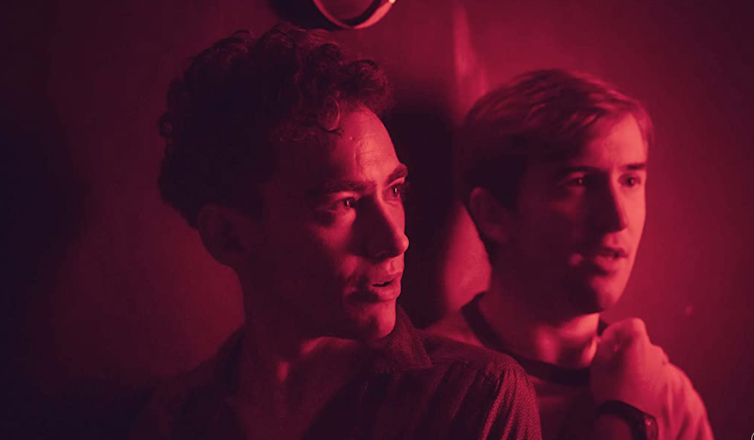 New intimacies are forged.
Red Production Company
New intimacies are forged.
Red Production Company
There are lessons here about the importance of engaging with — rather than disciplining and policing — communities. The “Australian-Response”[5] to HIV/AIDS was hailed as a success because the state engaged with and learnt from those vulnerable to the disease to develop community-led policy.
Read more: Friday essay: recognising the unsung heroes of Australia's AIDS crisis[6]
Part of the mastery of the show is that we, as viewers, share the fears of these young men and their friends. We know what is coming, even if they don’t. We find ourselves wondering who from the Pink Palace and their friends will be struck down.
In one episode, one of the housemates is forcibly and legally detained in hospital after his diagnosis. His mother and friends hire a lawyer to release him so he might be cared for by those who understand him.
Watching this makes for difficult viewing. Queer networks, however, power the show. They hold those who are sick, comfort those who are stricken by loss, and politically mobilise to force the state to act. They share grief with parents who lose their sons, holding to account families whose love turned out to be conditional.
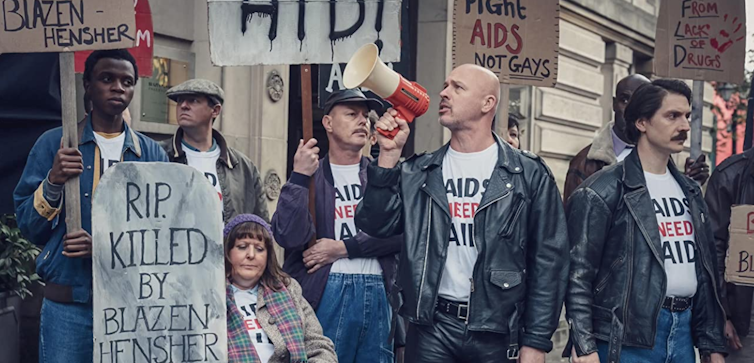 Queer networks power the show, politically mobilising where needed.
Red Production Company
Queer networks power the show, politically mobilising where needed.
Red Production Company
This is queer intimacy as life-saving.
This is friendship as primary nourishment and radical politics.
Less rigid boundaries
The emotional and narrative centre of It’s a Sin is a home. But this home looks quite different to the one our leaders today might imagine when they issue stay-at-home orders — almost always referring to a family when doing so. It’s certainly not organised around a couple (and the children).
The boundaries around the Pink Palace are porous, people come and go, and you never know who might be at the breakfast table. It is, however, affirming in its instabilities. For Roscoe, this home is an escape from a familial home that was a place of violent rejection.
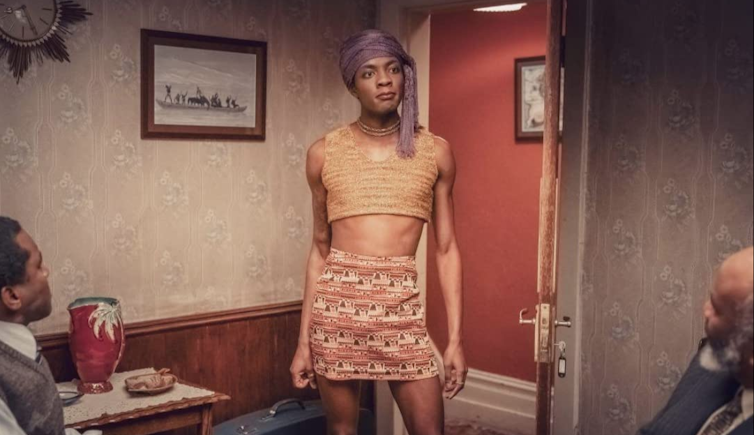 Roscoe (Omari Davis) flees a violent, rejecting familial home.
Red Production Company
Roscoe (Omari Davis) flees a violent, rejecting familial home.
Red Production Company
And that, I think, highlights the challenge facing so many queers in lockdown today. Queer lives are often organised around friendships, (as indeed are many others not oriented around a romantic couple). Boundaries around queer homes may be less rigidly drawn. The intimacies and communities that sustain living queer, enabling joyful exploration of who we might become with each other, are often forged both within and beyond the walls of our home.
This is why so many queer friends I know are struggling. Lockdown hasn’t simply shut down our capacity to dance and have fun, or to have casual (and thus apparently meaningless) sex. It has turned the spaces beyond our homes, in which we nourish our queer selves, into sites of danger. It has turned having your friends over and snuggling on the couch into a breach of duty.
Which is to say, much like the HIV/AIDS epidemic, the impact of lockdown is being felt unevenly and with different effects.
On the release of It’s a Sin, there was much public discussion about the ways in which this show re-imagined the experience of HIV/AIDS for a generation far enough removed from the early years of the epidemic to understand it as history rather than experience.
Watching this series now, though, I find myself mourning the everyday, public, and non-familial intimacies of queer life lost to us during lockdown. It might not have provided solace, but it has helped me to explain my sense of loss.
It also made me wail. And perhaps having a good cry is what many of us need.
It’s a Sin is showing on Stan.
References
- ^ Our writers nominate (theconversation.com)
- ^ Neeraja Sanmuhanathan has written (theconversation.com)
- ^ Think of it this way: at least you're not locked down with drunken, misanthropic bookshop owner Bernard Black (theconversation.com)
- ^ Year and Years frontman (ew.com)
- ^ “Australian-Response” (press-files.anu.edu.au)
- ^ Friday essay: recognising the unsung heroes of Australia's AIDS crisis (theconversation.com)

















